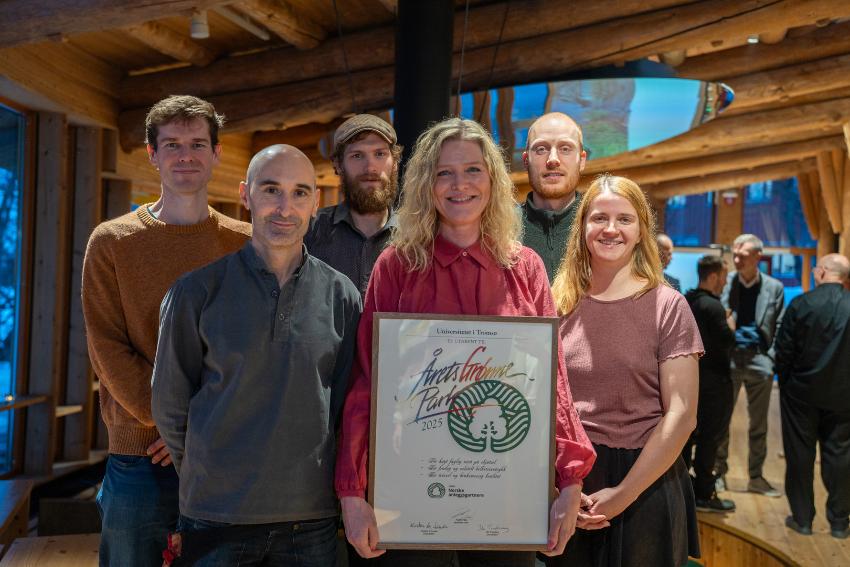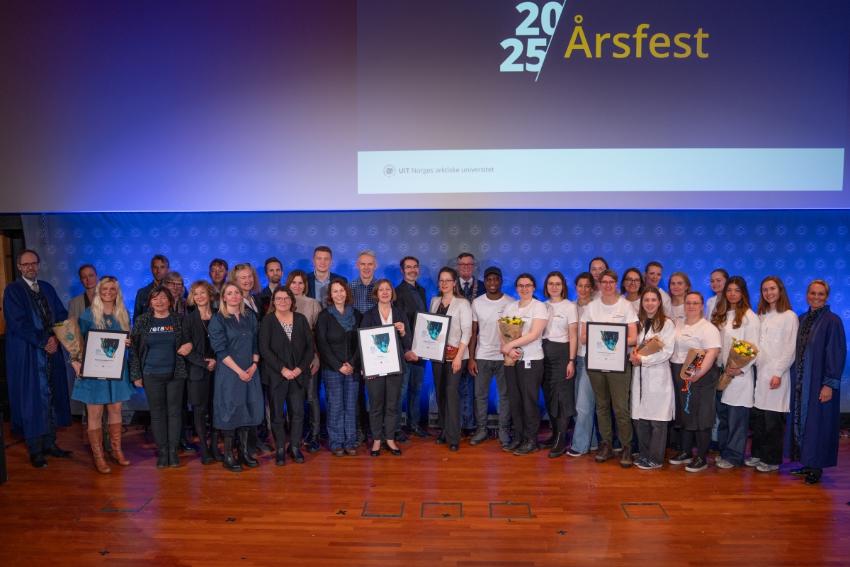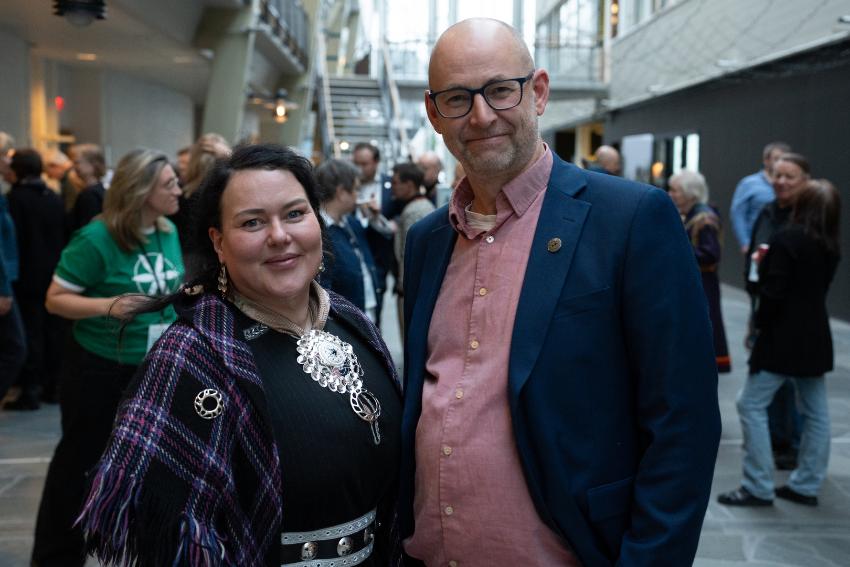Ny PhD på Det juridiske fakultet
Vi gratulerer Kristine Elfrida Dalaker som 6. april forsvarte sin doktorgradsavhandling.
Tittelen på avhandlingen hennes er “Robust Institutional Arrangements for the Conservation and Sustainable Use of Marine Biodiversity in Areas Beyond National Jurisdiction”. Dalaker er tilknyttet Norsk senter for havrett og fikk tildelt “The Role of the United Nations in the Development of the Law of the Sea” som tema for sin prøveforelesning.
Bedømmelseskomiteen besto av førsteopponent Professor James Harrison, Edinburgh Law School, andreopponent Professor Elisa Morgera, University of Strathclyde, og Professor Irene Vanja Dahl, UiT Norges arktiske universitet. Disputasen ble ledet av dekan ved det juridiske fakultet, professor Tore Henriksen.
Kort populærvitenskapelig sammendrag av avhandlingen på engelsk:
This dissertation investigates the robust institutional arrangements that will be needed to implement the treaty that is being negotiated under the auspices of the United Nations for an international legally binding instrument under the United Nations Convention on the Law of the Sea (UNCLOS) for the conservation and sustainable use of marine biological diversity of areas beyond national jurisdiction (BBNJ). If the negotiations are to conclude with a treaty that can meet its objective of ensuring the long-term conservation and sustainable use of BBNJ, the treaty must be built on an institutional foundation and architecture that is sufficiently robust to ensure its successful implementation.
This author has selected Elinor Ostrom’s theoretical framework of polycentric governance as the relevant framework to examine how to build robust institutional arrangements for the BBNJ treaty. Ostrom identified the best practices of institutional arrangements that had achieved sustainable outcomes for common-pool resources in developing her theoretical framework for polycentric governance. Ostrom presented the institutions’ best practices, or ‘design principles’, as those factors that contribute to the robustness of institutional arrangements.
Given that Ostrom’s framework is a study in robustness, it provides the means for this dissertation to answer the research question posed by this study regarding the robust institutional arrangements that will be needed for the implementation of the BBNJ treaty. Focus is given in the analysis to Ostrom's eighth design principle for nested enterprises and the requirements for adaptive governance using a law of the sea example of nested governance. The research question is answered by analyzing the three articles that comprise this article-based dissertation. The analysis renders recommendations for the building of robust institutional arrangements for the BBNJ treaty that would provide the legal authority for the implementation and operationalization of the treaty.
Kortnytt fra Det juridiske fakultet
-
Fiskeri- og havbruksvitenskap - bachelor
Varighet: 3 År -
Fiskeri- og havbruksvitenskap - master
Varighet: 2 År -
Akvamedisin - master
Varighet: 5 År -
Bioteknologi - bachelor
Varighet: 3 År -
Peace and Conflict Transformation - master
Varighet: 2 År -
Computer Science - master
Varighet: 2 År -
Geosciences - master
Varighet: 2 År -
Biology - master
Varighet: 2 År -
Computational chemistry - master
Varighet: 2 År -
Law of the Sea - master
Varighet: 3 Semestre -
Biologi - bachelor
Varighet: 3 År -
Rettsvitenskap - master
Varighet: 5 År -
Nordisk - årsstudium
Varighet: 1 År -
Historie - årsstudium
Varighet: 1 År -
Arkeologi - bachelor
Varighet: 3 År -
Pedagogikk - master
Varighet: 2 År -
Informatikk, datamaskinsystemer - bachelor
Varighet: 3 År -
Informatikk, sivilingeniør - master
Varighet: 5 År -
Allmenn litteraturvitenskap - årsstudium
Varighet: 1 År -
Geovitenskap- bachelor
Varighet: 3 År -
Samfunnssikkerhet - bachelor
Varighet: 3 År -
Farmasi - master
Varighet: 2 År -
Romfysikk, sivilingeniør - master
Varighet: 5 År -
Bærekraftig teknologi, ingeniør - bachelor
Varighet: 3 År -
Filosofi - bachelor
Varighet: 3 År -
Anvendt fysikk og matematikk, sivilingeniør - master
Varighet: 5 År -
Barnevern - bachelor
Varighet: 3 År -
Arctic Nature Guide - one year programme
Varighet: 1 År -
Sosialt arbeid - bachelor
Varighet: 3 År -
Arktisk friluftsliv og naturguiding - bachelor
Varighet: 3 År -
Arktisk friluftsliv - årsstudium
Varighet: 1 År -
Grunnskolelærerutdanning for 1.-7. trinn - master
Varighet: 5 År -
Governance and Entrepreneurship in Northern and Indigenous Areas - master
Varighet: 4 År -
Vernepleie - bachelor
Varighet: 3 År -
Internasjonal beredskap - bachelor
Varighet: 3 År -
Barnevern - bachelor
Varighet: 3 År -
Vernepleie - bachelor
Varighet: 4 År -
Landskapsarkitektur - master
Varighet: 5 År -
Grunnskolelærerutdanning for 5.-10. trinn - master
Varighet: 5 År -
Ph.d.-program i naturvitenskap
Varighet: 3 År -
Environmental Law - master
Varighet: 2 År -
Ph.d.-program i humaniora og samfunnsvitenskap
Varighet: 3 År -
Ph.d.-utdanning i rettsvitenskap
Varighet: 3 År -
Ph.d.-program i realfag
Varighet: 3 År -
Velferdsendring - erfaringsbasert master
Varighet: 4 År -
Ph.d.-program i nautiske operasjoner: Fellesgrad
Varighet: 3 År -
Samfunnsøkonomi med datavitenskap - master
Varighet: 2 År -
Luftfartsvitenskap - master
Varighet: 3 År -
PhD Programme in Science
Varighet: 3 År -
PhD programme in Nautical Operations
Varighet: 3 År






